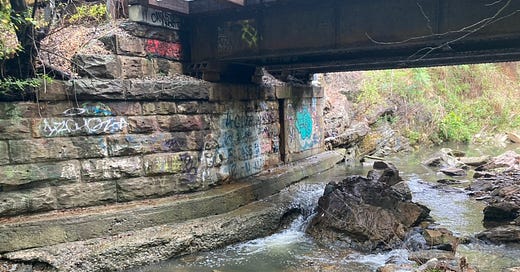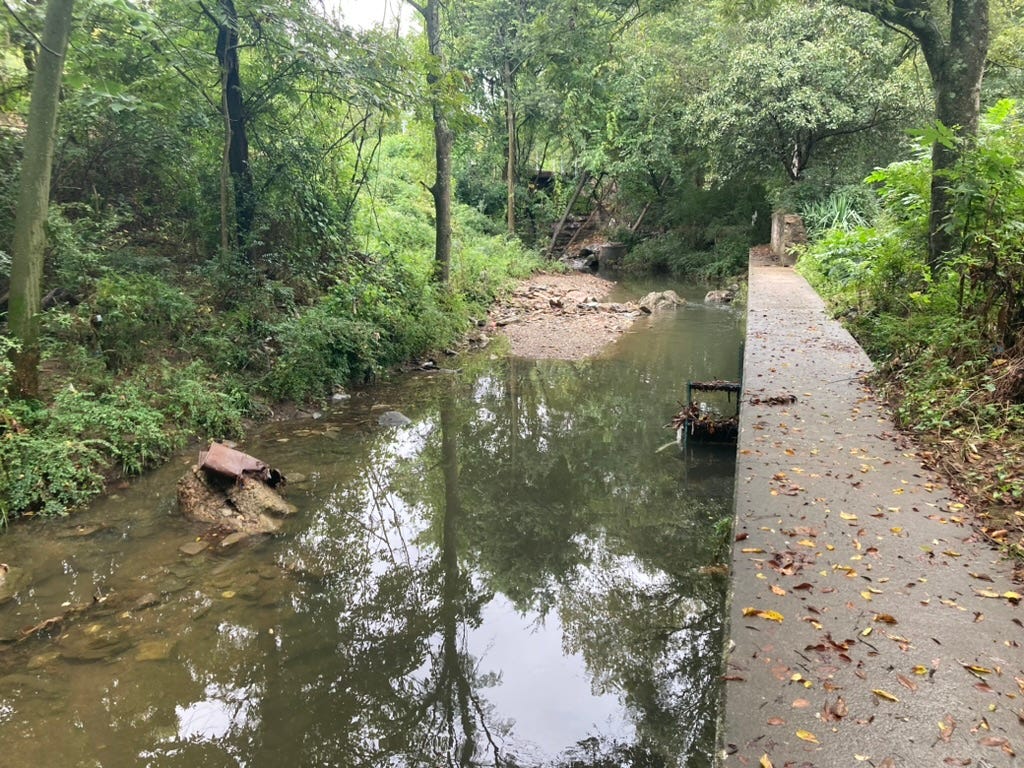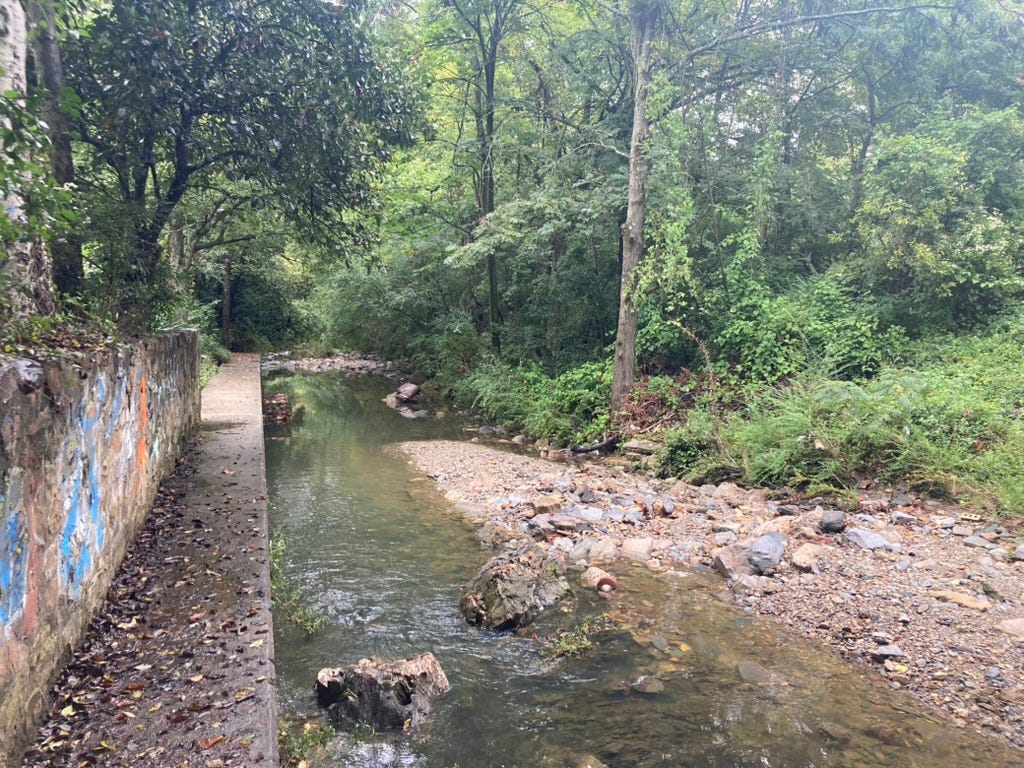Then the angel showed me the river of the water of life, bright as crystal, flowing from the throne of God and of the Lamb through the middle of the street of the city. On either side of the river is the tree of life with its twelve kinds of fruit, producing its fruit each month, and the leaves of the tree are for the healing of the nations. —Revelation 22:1-2
Last spring my brother-in-law gave me a fishing pole for my birthday. It was a Tenkara rod, a minimalist style drawn from traditional Japanese mountain fly fishing. Using only a rod, line, and fly traditional Tenkara fishers hike high into the mountains to pristine streams to seek their catch.
I loved the present and wanted to use it as soon as I could. I however, don’t live a hike away from pristine a mountain stream. The water closest to my house is a polluted, urban creek.
Rose Creek, meanders through my neighborhood, channeled here and there by concrete, but mostly it follows its natural course down toward the Arkansas River. It is the base of our watershed, the connecting flow that links our neighborhood to the life of the river valley and beyond.
As the center of our neighborhood watershed, the stream collects the stuff of our yards and streets. If we use chemical fertilizers in our yards, the rains will carry them down the creek. If a stray drink straw or plastic toy is not picked up, it too will get carried to the stream by the next rain storm. Without the extensive surrounding forrest that buffered the creek over a century of ago, there are few natural filters to keep it from filling with trash.
One Sunday afternoon, I put on my backpack with my Tenkara rod, line, and a couple of flies, and walked to Rose Creek. There are efforts in the neighborhood to create a trail along it, following its banks to the river, so I followed the dirt path from where the pavement ran out, down the hill to a place where there are deeper pools of water. High voltage power lines soared over the trail at its start, and along the creek trains interrupted the quiet with their deafening rumble.
When I reached the creek, I carefully climbed down a concrete retaining wall and hopped across a narrow section of rocks to the opposite side. A shopping cart lay sideways in the water, and all around, up to the high water mark, bits of plastic were caught in the trees and shrubs along the bank. Though there were several oaks and red buckeyes growing in the woods in the lower section, much of the vegetation was made up of invasive privet and Japanese honeysuckle.
I unpacked my gear, attached the leader, line, and fly, and taking care not to get my feet in the polluted water, I cast my line. It was an apocalyptic act.
The book of Revelation ends around an urban river. It flows clear with life giving water. Across it grows a tree whose leaves offer healing to all people. The source of this river is the very throne of God.
This river, though, is no waterfall pouring down from above. It runs through the street, horizontal, because God’s throne is not in heaven. As we read in Revelation last week, God has come down to be with Creation, making a life among those finite, mortal creatures who live close to the ground. In the end, the story of our scriptures is not of rescue by way of evacuation but restoration through the healing of all creation.
This is an important thing to get right because it goes against so much popular religious imagination. In our scriptures there is no centering of disembodied spirits, flying up to heaven. The Bible begins and ends on earth, and heaven, that place of God’s unrelenting presence, is brought down to the ground where bodies are restored through resurrection and creation is liberated from its long groaning. Biblical hope is grounded, earthy hope.
The desire for escape is understandable. Life can be hard, and sometimes the burden of the unraveling we’ve wrought on earth limits our hopes. When we talk of apocalypse, we think of nuclear wastelands and rising seas, drought and famine. Wouldn’t it be wonderful to just leave this world behind for a better place? Heaven or Mars await, depending on your inclinations.
But apocalypse, that Greek word from which we get the title of Revelation, doesn’t mean disaster. An apocalypse can be a moment when suddenly you see a person for the beautiful, profound reality they really are. An apocalypse can be the realization of God’s pervasive love in the world. Apocalypse is simply the unveiling of a hidden reality, and both monsters and wonders can be obscured from our normal sight.
What the apocalypse in our scriptures calls us toward is a vision of the hidden nature of the world and its future. There are monsters to be sure, and they work evil and violence. Their character is blasphemous and arrogant, as pictured in the highly symbolic images of Empire in Revelation chapter 13. The people who first read the visions we now know as that book would have recognized their Emperors in these monsters and they would have felt the despair their seeming power wrought. But this unveiling doesn’t end there. The monsters will be defeated, and all the arrogance and evil by which they lived will one day fall silent. The true destiny of the world, the true hope for all creation, is the coming presence of God, the healing waters of life that will turn even a city into a garden.
It has been said that the Roman Empire never fell, it merely changed. Whether that is true or not, the reality is that the Powers of Empire, of Death, of the Machine or any of the other names by which we know this Legion, are still very much at play in the world. And with them we get all of the usual idolatry and arrogance. The result is polluted creeks and damaged people, violence and extraction. But the apocalypse John saw from his exile on the island of Patmos long ago, still invites us to recognize that the destiny of the world is different from all of that. Heaven will one day pervade earth and all will be healed.
The question this leaves us in the meantime is how does this vision of the end change how we act in the world now?
As I took my first casts with the Tenkara poll, I managed to land my fly upstream, just at the base of the pool. The current caught my fly and began carrying it down, along the surface. A small sunfish, a brim saw it, leaping up and grabbing the fly. I pulled and the hook caught in its mouth. I’d caught my first fish on the new rod.
The stream, despite the trash, the broken shopping cart, deafening rumble of the trains, was a beautiful place. There were small cascades and the rocks reflected what I’d expect to find in any Ouachita mountain stream in deeper wilderness. At one time this creek had belonged with those wilderness streams, long before the city was settled and its channels tamed by concrete.
In a way, fishing this stream with my fly rod, I felt as though I was relating to it as it was and will be. I was fishing this stream as though it was a wild creek in a wild place with clear running water flowing down toward the Arkansas River. By relating to this creek in this way, I was opening up a possibility for a future I hope this creek will have. A future in which its course will one day join as a tributary of the river of life.
To see the world with such apocalyptic eyes is to be invited into a vision of hope. What if we saw more people and places through a vision of their ultimate healing; the final restoration toward which all things will ultimately be brought? What if when meet a person who has lost the center of themselves through drugs or mental illness, we saw them in their wholeness and treated them as the person they really are? Such a vision of people and places, of creation in all its groaning pain, is what our scriptures call us toward. But it is not just a vision. Resurrection has already started. The works of restoration we begin now will be joined to God’s great work of healing for which we hope.
The next time I go down to the creek to fish beside its cool waters, I will again cast my line in the pool and listen in the quiet moments to the gurgle of its cascades. I will also bring a trash bag and fill it. It is a small, seemingly futile act, but I know that in doing it I am joining the work God will complete one day, in the end.






